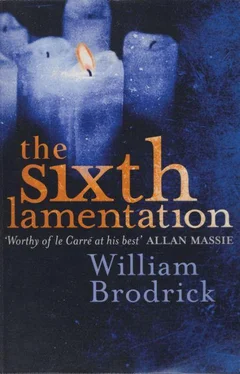William Brodrick - The Sixth Lamentation
Здесь есть возможность читать онлайн «William Brodrick - The Sixth Lamentation» весь текст электронной книги совершенно бесплатно (целиком полную версию без сокращений). В некоторых случаях можно слушать аудио, скачать через торрент в формате fb2 и присутствует краткое содержание. Жанр: Триллер, на английском языке. Описание произведения, (предисловие) а так же отзывы посетителей доступны на портале библиотеки ЛибКат.
- Название:The Sixth Lamentation
- Автор:
- Жанр:
- Год:неизвестен
- ISBN:нет данных
- Рейтинг книги:5 / 5. Голосов: 1
-
Избранное:Добавить в избранное
- Отзывы:
-
Ваша оценка:
- 100
- 1
- 2
- 3
- 4
- 5
The Sixth Lamentation: краткое содержание, описание и аннотация
Предлагаем к чтению аннотацию, описание, краткое содержание или предисловие (зависит от того, что написал сам автор книги «The Sixth Lamentation»). Если вы не нашли необходимую информацию о книге — напишите в комментариях, мы постараемся отыскать её.
The Sixth Lamentation — читать онлайн бесплатно полную книгу (весь текст) целиком
Ниже представлен текст книги, разбитый по страницам. Система сохранения места последней прочитанной страницы, позволяет с удобством читать онлайн бесплатно книгу «The Sixth Lamentation», без необходимости каждый раз заново искать на чём Вы остановились. Поставьте закладку, и сможете в любой момент перейти на страницу, на которой закончили чтение.
Интервал:
Закладка:
In the three months that had passed since Agnes had told the family about her illness, the tight pattern of relating, built up over so many years, had begun to fall apart, threatening something more significant, like the one or two loose rocks that topple down a scree. Freddie came to visit his mother more frequently, tussling with the old awkwardness he preferred to avoid; Susan’s spirits rose as she saw the coming together of separate worlds — not just that of her husband and mother-in-law but also their daughter. As Lucy recognised, she had once been the small hub in a wheel where everyone else’s long spindles found a meeting place: that arrangement had splintered a while ago, but now, with the news that Agnes would soon die, a strange re-ordering of things was under way As with all great changes, there was a constant: Lucy came frequently with market vegetables in brown paper bags.
The subtle transformation was not restricted to the inner workings of Lucy and her parents. Agnes, too, was on the move. Arriving unannounced one afternoon, Lucy found a pile of newspapers in the hail. Surreptitiously she leafed through them: two or three bore the same date and cuttings had been taken. As she realigned the pile, puzzled, Lucy halted, suddenly identifying the subtle difference in ambiance that had struck her as soon as she opened the door, but which she had not been able to name: the radio was on. She crept into the kitchen. Grandpa Arthur’s Roberts had been retrieved from some forgotten place and now stood upon the windowsill by the sink. Agnes was twisting the dial, grumbling about modern music.
On another day Lucy rushed into the sitting room chasing a stray cat that had formed an unreciprocated attachment to Agnes but who, out of mercy had been granted a tenancy The beast escaped through the window Turning to go, Lucy caught the tiny twinkle of a red light. She scanned the familiar room as though she were a traveller in a foreign land: the record player was on; the piano lid was open… there was music on the rest. Lucy glanced at the title: ‘Romance sans parole, No. 2’ by Faure, her grandmother’s favourite melody All at once Lucy saw Agnes, alone, when she knew no one would call, her long fingers finding their way across the keys.
As for Agnes, she was slower, more measured in her movements, and when she walked from one room to another she held out her slender arms like a ballet dancer, touching objects lightly as she passed — sometimes it was only the leaf of a plant — as if dispensing blessings.
‘I don’t need to, but I like to feel something on either side,’ explained Agnes.
She was losing her balance.
On a muggy afternoon in early July Lucy rang Cathy Glenton and arranged a night out. Then she went to Chiswick Mall, resolved to touch upon what her father called ‘the real issue’. She stood over the piano, playing ‘Chopsticks’ slowly, with two fingers, her heart in her mouth. ‘Gran, you’re going to need specialist help.’
‘Please, anything but that,’ Agnes pleaded.
‘I’m sorry, but it’s true. Someone has to tell you.’
‘I mean that tune. For God’s sake, stop it.’
‘I’ve played it every time I’ve- ‘
‘Believe me, I’ve listened!’ said Agnes impatiently There was an uneasy pause.
Lucy bit her lip. ‘I meant what I said, you- ‘Yes, yes, yes, I know Don’t worry. I’m all right for now And anyway, there’s always Wilma.’
Lucy gaped and almost exclaimed: a bag-lady… I thought you just met in the park…
Agnes swiftly shut down any objections. ‘Wilma’s a very interesting person. She used to be in the theatre. Did a lot of Rep. I’ll introduce you.’ She smoothed a pleat on her skirt. ‘She’s my friend, Lucy Don’t shut her out.’
‘Of course not,’ said Lucy uncertainly Before she could draw her thoughts together, Agnes continued, with assumed cheerfulness, ‘Anyway, enough of that. Let’s have a cup of tea. ‘
They moved awkwardly into the kitchen.
‘There’s always some rubbish on about now,’ said Agnes, moving towards the radio, touching a chair… and then a counter… and then the sink. She turned the control. Suddenly there was a sort of explosion. An orchestra was involved… and a jazz band. And someone, thought Lucy, listening carefully… is hitting a biscuit tin of broken glass.
‘Post-modern, you know,’ said Agnes, nodding gravely, ignoring the tension between them.
Lucy made the tea and they sat nursing their mugs, their eyes frequently meeting. Lucy was going to raise the subject of professional help again whether Agnes liked it or not. But the glances from her grandmother made it clear she would not budge, she would make her own arrangements. And, as if providing a soundtrack to a silent film, an out-of-tune jazz band fought with an orchestra while someone had a whale of a time with a hammer.
Lucy chose her moment when a languid, knowing voice ushered in the news at five o’clock. But Agnes outflanked her with a newfound passion for current affairs. She sat forward with a convincing display of concentration. The swift volley of headlines between broadcasters began but Agnes dismissed each new story with a pout before the introductions ended. After a few minutes, she signalled with her head to turn it off. A clatter of falling plates echoed from the dining room.
‘That blasted cat.’
‘Sounds post-modern to me,’ said Lucy, nodding gravely
Agnes rose to investigate, touching a lamp-stand, a chair and the door on her way She wasn’t going to discuss the need for help any more that day
Lucy was getting ready to leave when Agnes handed over the key to her Morris Minor, bought by Grandpa Arthur in 1963. She’d named it Duchess.
‘It’s no use to me any more.
‘But Gran-’
‘Take her. I’ve arranged the insurance. But treat her gently She’s a tired old bird.’
Before Lucy could find words of thanks, Agnes produced a manila envelope. She said, ‘There’s a notebook inside. I want you to read it. But say nothing of what you learn. Not to anyone.
‘What’s it about?’
‘You’ll find out.’
Lucy frowned.
‘Don’t worry,’ said Agnes. ‘I just want you to know more… about me’ — she hesitated, embarrassed — ‘before I die.’
These last words fell on Lucy like a sword. Her composure slumped and, with rising tears, she turned quickly to go. By the vestibule door she caught her foot on a pile of newspapers. Lucy stared at them, as if they might speak.
‘The answer’s in the notebook,’ said Agnes, looking aside. ‘Don’t cry for me, please don’t cry’
As Lucy turned the ignition she looked back to wave and saw Agnes with one hand on the doorframe. Her face was drawn and she looked terribly small and alone. Something had drained out of her.
Cathy opened the door to her flat in Pimlico later that evening before Lucy could even ring the bell.
‘I’m just getting ready,’ said Cathy ‘Fancy a meal out?’
‘No, thanks.’
They walked into a sitting room of astounding chaos, clothes thrown everywhere, junk mail scattered like discarded handouts after a demonstration. The walls were covered with posters from various exhibitions.
‘A drink?’
‘No…’
Cathy flopped on to a sofa and said: ‘What’s wrong?’
The fact that they rarely saw each other somehow set Lucy free to say what she had said to no one else: ‘My grandmother’s going to die from a disease I’d never heard of until now It attacks your body but leaves the mind alone. In full throttle you just lie there unable to move or talk, blinking at the ceiling. You feel as if you’re going to choke to death but it doesn’t happen. That’s where you stay, right on the edge of dying, but you remain alive.’
Читать дальшеИнтервал:
Закладка:
Похожие книги на «The Sixth Lamentation»
Представляем Вашему вниманию похожие книги на «The Sixth Lamentation» списком для выбора. Мы отобрали схожую по названию и смыслу литературу в надежде предоставить читателям больше вариантов отыскать новые, интересные, ещё непрочитанные произведения.
Обсуждение, отзывы о книге «The Sixth Lamentation» и просто собственные мнения читателей. Оставьте ваши комментарии, напишите, что Вы думаете о произведении, его смысле или главных героях. Укажите что конкретно понравилось, а что нет, и почему Вы так считаете.












